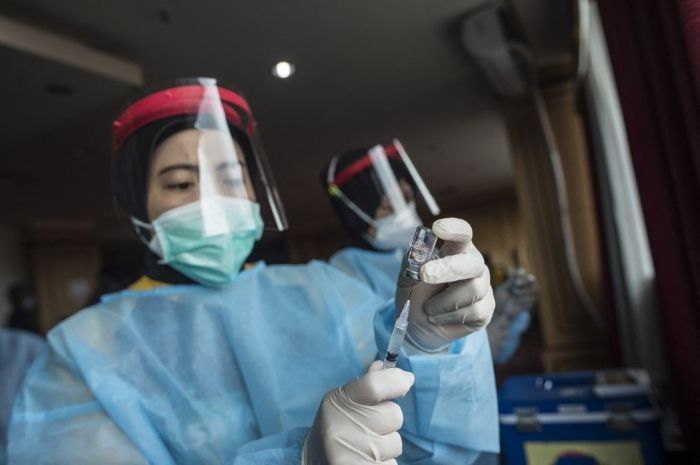PGH: Almost 94% of staff willing to receive COVID-19 jab after ‘massive’ info drive

MANILA, Philippines — Confidence in coronavirus vaccines among Philippine General Hospital employees leaped by about 20% after the hospital launched a "massive" information campaign, its spokesman said Friday night.
In an interview with One News' "The Chiefs," physician Jonas del Rosario, PGH spokesman, said an initial survey conducted last month with about 2,000 of the hospital's staff saw only 75% agreeing to be inoculated against COVID-19, while 25% said they would like to wait a bit longer.
"Three days ago, we started doing the actual registration and screening, and to our surprise in a way, pleasantly surprised, the percentage of people who would like to be vaccinated, based on the actual registration, is close to almost 94%," he said. "[S]o there was an increase of almost like 20% from the survey."
The remaining 6% are undecided, Del Rosario said. "[M]ostly they just want to see, they're not ready yet, they want to wait for the long-term follow-up of patients or those who have already been vaccinated."
The PGH is the top COVID-19 referral hospital of Metro Manila, which is still the epicenter of the country's coronavirus outbreak. In the national government's vaccine rollout plan, the PGH will be the first to receive the badly-needed jabs, the first shipment of which is expected later this month.
Del Rosario, who, according to a Rappler report, previously contracted COVID-19 and lost his parents to the deadly virus, will be the first person in the country to receive an authorized coronavirus vaccine, doctor Gerardo Legaspi, PGH director, announced during a Palace briefing on Thursday.
Information drive to dispel vaccine fears
Asked to account for the sharp rise in vaccine confidence, Del Rosario attributed it to a "combination of factors."
First, he said, the hospital "addressed a lot of the concerns of those who were undecided."
"[A]fter that survey, we made a massive campaign, an infographic as you may call it, we started giving them the basics of vaccines, the different types of vaccines, the side effects," Del Rosario said. "So, I think education helped."
"I also admit that there was some bandwagon effect," he added, noting that some people signed up after seeing colleagues and health workers signing up to receive the vaccine. However, that willingness to join in, he said, implies that there were no strong feelings against the vaccine among those people.
"And thirdly, I have to be honest, some say that its because.... they already know the brand of the vaccine that we will be given," Del Rosario said. "When they learned that it's going to be Pfizer, then the confidence went up."
"A lot of these people have relatives abroad. You know, we have a lot of friends from the US showing that they already have a vaccine of Pfizer and Moderna."
Pfizer vaccines from the COVAX facility were supposed to be the first to arrive under the national government's vaccination plan, but the Palace at the same Thursday briefing announced a delay in the shipment.
Only Sinovac's jab, the Phase III trial results of which have not yet been released by its Chinese manufacturer, are sure to arrive this month — 600,000 doses, to be exact, donated by Beijing.
Despite the boost in confidence attributed to the acquisition of Pfizer jabs, Legaspi on Thursday assured that PGH workers would be willing to take any vaccine approved by the country's FDA. So far, local regulators have granted emergency use authorization to Pfizer and AstraZeneca's jabs, while applications from Sinovac, Moderna, Gamaleya and other biotech companies are still under review.
A survey conducted by Pulse Asia, polling 2,400 respondents from November to December last year, found that only 47% of Filipinos were willing to be inoculated against COVID-19. An overwhelming 84% of those unwilling to be vaccinated said they were concerned that the jabs would not be safe.
— Bella Perez-Rubio
- Latest
- Trending





























